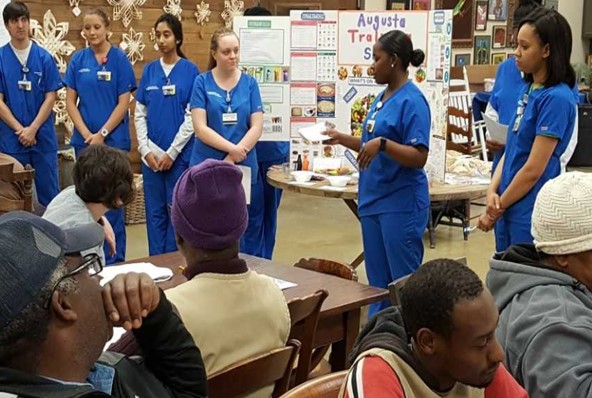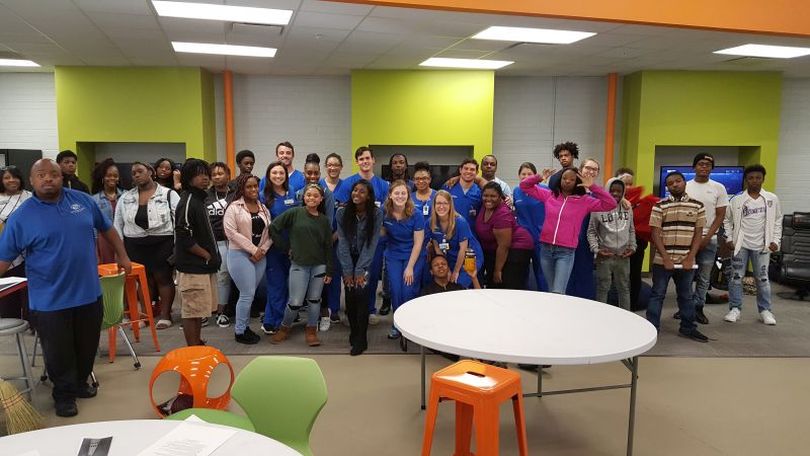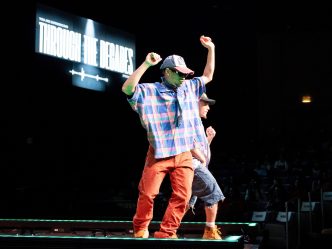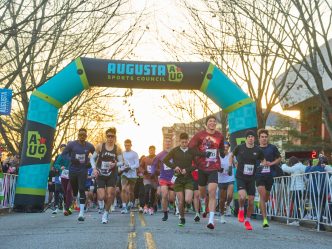When most people think of nurses, they picture them in clinical settings like a hospital or doctor’s office. But, nurses also play a vital role in community health as well. This is something senior Bachelors of Nursing Science (BSN) students at the Augusta University College of Nursing discovered through projects in their Community and Public Health Nursing course.
In the course, students work with an at-risk population or an organization that provides services to those who experience health disparities in the Augusta area. There are a variety of populations the nursing students can choose from, including elementary school children, teens, rural communities, and homeless populations.
No matter the organization the students choose, the project works the same. They must first determine the needs of that population through a needs assessment to gain a better understanding of needs and challenges of their chosen population. They also assess the resources available and the baseline knowledge of their population. Using this information and current nursing evidence, students develop a health care intervention, often a health-related teaching activity. Then, the students evaluate the effectiveness of their intervention.
“I think it offers a unique experience for the students because many of them are experiencing people who live differently than they do,” said Dr. Carol Hunter, CON assistant professor and course coordinator. “The university has a focus on ‘Beyond Boundaries’ and experiential learning, and this certainly falls within that category because they are going out and learning about community assessment, and interventions, and nursing care beyond the classroom.”
Boys & Girls Club
One group of nursing students chose to present to the local Boys & Girls Club. The first few days were spent understanding the group’s needs and bonding with the teens. “We spent a few days hanging out with the kids and getting to know them,” said Kali Gegen, a BSN student. “It was mainly just talking to them and getting to see what their needs were for our project.”
Many of the teens mentioned they were interested in learning about college and how to plan for the future. The nursing students also saw a need for education for alcohol and drug abuse as well as nutrition and fitness.
Ultimately, the nursing students decided to have three interactive educational stations. “We wanted to have multiple options because we didn’t want to do just one presentation — just having them sitting there,” Jordon Wakefield said. “We wanted them to be involved, so we decided to do multiple stations. They could rotate and be involved in each station, but all stations were about healthy decision making.”
The stations gathered small groups, allowing the nursing students to interact with the teens in a more conversational manner. They also had resources such as posters and pamphlets available. This format allowed the teens to feel comfortable enough to ask questions and engage with the nursing students, said Gegen.
According to Courtney Middlebrook, when designing the educational materials, the nursing students tried to meet the students where they are. Middlebrook headed the nutrition session and mentioned that many teens are responsible for taking care of their siblings after school and may not always have access to healthier options. With this in mind, she emphasized making small changes.
“Obviously, we spoke about limiting sugar and stuff like that,” Middlebrook said. “We also explained to them that when you go to fast food restaurants, you don’t always need to start off cold turkey. You can start off by switching out one or two things. Instead of having fries, you can have some apple slices or a salad.”
After the educational sessions, the nursing students tested the teens’ knowledge with a game of Jeopardy. They were elated to find out that their intervention was successful. “They did very well,” Wakefield said. “We were pleased that they actually retained our information and listened to what we were saying. They we so involved in what we provided for them.”
Augusta Training Shop
Some nursing students were involved in a project at Augusta Training Shop, a nonprofit providing jobs to people with mental and physical disabilities. There, they identified a need for education on nutrition and hygiene. Like other groups, these students wanted to create something engaging, so they developed a coloring and activity book. They also used interactive demonstrations, such as using a measuring cup to illustrate how to portion food.

Overall, the project was enjoyable for both the nursing students and the community. “We got really good feedback from our professor and those at the Augusta Training Shop,” Logan Pogue said. “I think they liked the interactive learning.”
Though the project the students learned to overcome certain challenges and make lessons accessible to all. According to Kayla Pinkard, during the handwashing lesson one person asked what to do if they only have one hand. “That made me really consider a broader spectrum of patients and the need to focus on each patient as an individual,” she said. “We had to adapt out teaching method, but we found a solution for her.”
Tiffany Johnson also mentioned the opportunity to polish their communications skills, “I feel like our particular population was very special in terms of communication, so we really got to develop those skills.”
According to Hunter, many students attend nursing school planning to enter the health care field and work in settings associated with hospital-based care. Instead, this course challenges the students to see and experience nurses working in a wider variety of roles beyond the hospital. She said, “This gives them a chance to get out in the community and see that other aspect of nursing that they didn’t really think about before they came to nursing school.”
Similarly, Shenequoa Blash said, “We tend to forget about community roles because we don’t have clinical in a community setting, so this was an opportunity to get exposed to something different.”
Some students said they plan to continue volunteering outside of their full-time jobs as nurses or maybe integrate community health into their nursing careers. Although most of the students will ultimately end up in a more traditional nursing setting, such as a hospital, many of them will take with them the lessons learned from the community they served.
 Augusta University
Augusta University




